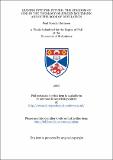Leaning into the future : the kingdom of God in the theology of Jürgen Moltmann and in the Book of Revelation
Abstract
This thesis is a dialogue between Jurgen Moltmann and the Book of Revelation on the theme of the kingdom of God. In addition to charting out the dialogue. Chapter 1 sets the stage for it through a theoretical reflection on its viability, and places the broad strokes of Moltmann's understanding of the kingdom within his theological project as a whole. Chapter 2 looks at how Moltmann sees the kingdom as the symbol of hope for humanity, and chapter 3 at how he understands the paradoxical and hidden presence of God's coming reign in history. The latter halves of these chapters contain appraisals of the strengths and weaknesses of Moltmann's portrait of the kingdom. The analysis of Revelation will commence with a short chapter (chapter 4) that both looks at the broad strokes of Revelation's kingdom language and shows how Moltmann and Revelation develop their respective understandings of the kingdom in response to similar crises. The analysis of this theme in Revelation will follow a similar movement as seen in chapters 2 and 3: chapter 5 considers how Revelation depicts the future as a regime change, as the time when God will assume the position of geopolitical authority over the earth; and chapter 6 looks at how the book uses kingdom language in its depiction of God (who he is and how he accomplishes his purposes) and in its portrayal of the church. In the latter half of these chapters, the analysis of Moltmann is brought into conversation with Revelation, considering how Moltmann may guide a contemporary reading of the book, and how Revelation suggests ways problematic areas of Moltmann's view may be solved. The concluding chapter will look at what the thesis has sought to accomplish and what further questions it raises.
Type
Thesis, PhD Doctor of Philosophy
Collections
Items in the St Andrews Research Repository are protected by copyright, with all rights reserved, unless otherwise indicated.

